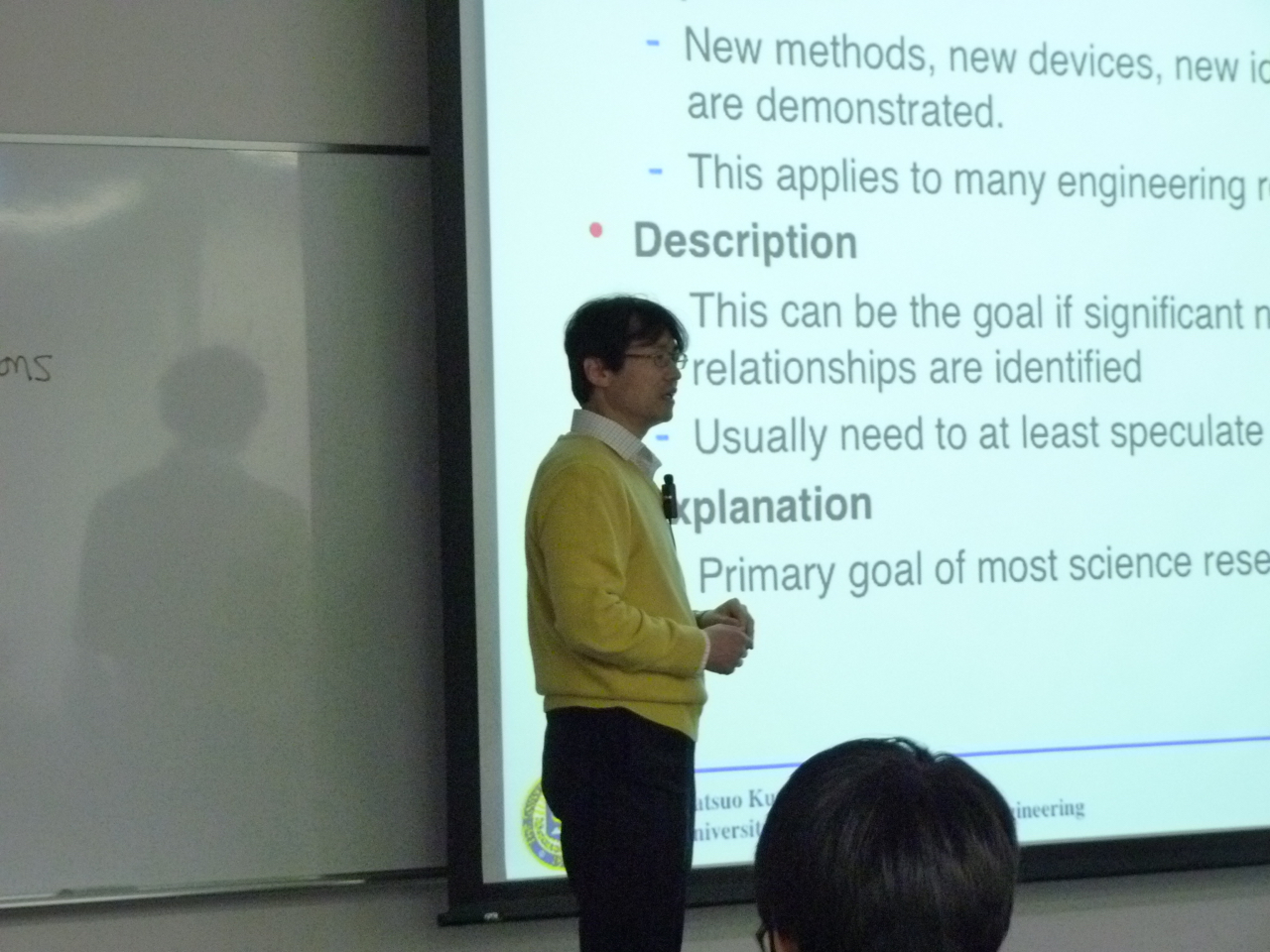The 23rd, 24th, 25th, 26th, and 27th JUACEP Seminars
March 20, 2015
Two professors at University of Michigan had seminars for JUACEP.
The 23rd, 25th, 26th and 27th Seminars by Prof. Katsuo Kurabayashi
24th Seminar by Prof. Kazuhiro Saito
- The 23rd Seminar:'ミシガン大学における産官学連携の事例について'(日本語にて実施)
- 1980年代初頭から続く科学技術におけるイノベーションと製品化との乖離によって、ハードウェアにおける米国のイノベーションエンジンは活力を失った。このイノベーションエンジンの復活の鍵として、大学・国立研究所レベルの基礎研究と民間レベルの製品開発とのギャップを埋めるメカニズムが模索されている。そのメカニズムとして、21世紀の米国大学が追求するものがTranslational Research(技術移行研究)である。このセミナーは、米国が21世紀の製造業大国復活に向けた国家的戦略と、それに付随した産官学連携の取り組みをミシガン大学における事例をもとに紹介する。ミシガン大学産官学連携研究センターの例として、(1) 米国科学財団(NSF)によるResearch Center for Wireless Integrated Microsystems, (2)国立衛生研究所(NIH)によるNetwork for Translational Research, (3) US-China Clean Energy Research Center, および(4) Advance Battery Coalition for Drivetrainsにおける研究・教育活動に触れる。
- The 24th Seminar:'Topology Optimization of Multi-Component Structural Assemblies'
- After nearly three decades of continuous development, structural topology optimization techniques
are matured to the point that problems with industry-level complexity can be solved with a personal
computer. However, its widespread industry adaptation is still limited since theptimized results often
require manual design modifications due to poor manufacturability. In particular, it is often the case
that an optimized topology must be decomposed to multiple components with simpler geometries, since
manufacturing as a single piece is either impossible or uneconomical. The resulting decomposed
topology is no longer optimal since the decomposition introduces the joints that have different
mechanical properties from the base material.
This talk intends to provide a historical overview of topology optimization techniques for designing multi-component structural assemblies including oversights in earlier approaches. Recent attempts for extending to multi-material and 3D printed structures will also be discussed. - The 25th Seminar:'グローバリエーション時代のアメリカ理工系大学院留学'(日本語にて実施)
- 「グローバリゼーション」、この言葉は近年多くの分野で耳にします。世界はITや物流技術の発達により、ますますフラット化し、資本は次の有望なマーケットを狙い世界を駆け巡ります。こうした状況の中、国外の大学ではグローバリゼーションの波を受け、人材は世界的に流動しています。これからの皆さんの将来のキャリアを考えた時に、世界で通用し活躍する理系人材になるにはどうすればよいでしょうか。その選択肢の一つが、米国大学院留学です。このセミナーは、倉林教授のスタンフォード大学留学の経験と、ミシガン大学で教鞭を執られている経験から、米国の大学院での学位取得と将来のキャリアパスなどをお話しいただきます。
- The 26th Seminar:'Approaches to successful research planning and paper writing'?E?主にJUACEP派遣プログラム参加希望学生対象?E?E
- Planning research requires clearly defining problems, solutions, and impacts of your study. Skills to logically address the critical information in your research presentations and publications are key to success as engineering scientists. This lecture will discuss how to design, conduct, and disseminate your research based on a lecture offered to senior students in the College of Engineering at the University of Michigan. This lecture primarily targets senior undergraduate students and 1st-year master's students as its audience. Those who plan to attend this lecture are asked to read some reading assignments prior to the class and to be prepared for in-class discussions.
- The 27th Seminar:'成功する英語面接へのアプローチ
- ※JUACEP派遣プログラム参加希望学生を対象とした英語面接対策講義
 |
Graduate School and School of Engineering,Nagoya University
Furo-cho, Chikusa-ku,
Nagoya,
464-8603, JAPAN
| TEL FAX |
+81-52-789-2799 |
|---|---|
| juacep-office@engg.nagoya-u.ac.jp |